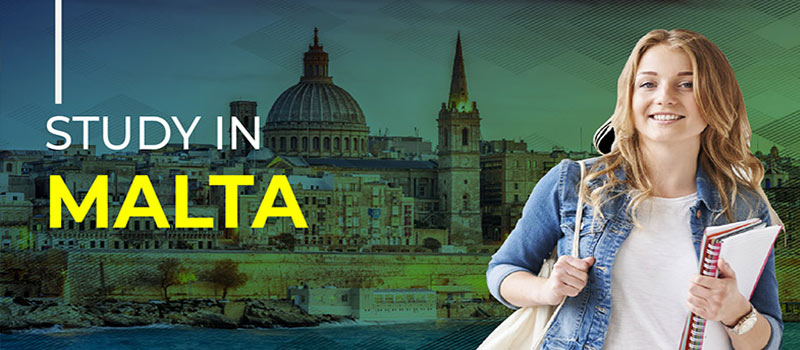
Study in Malta
The Maltese islands are home to a remarkable cultural mixture between the
ancient and the modern. Although the country harbours one of the oldest
universities in the Mediterranean, the higher education system is futureoriented and blends tradition with innovation.
Due to the size of Malta, there is only one university and one vocational college
made up of a number of individual institutions. However, they both have a good international reputation. About 600 full-time international students and about
500 exchange and transfer students come every year to Malta from about 80
different countries. The country maintains partnerships and links with education
institutions all over the world.
1. It’s free for EU/EEA students
If you’re from the European Union (EU) or the European Economic Area (EEA)
and want to study at the University of Malta — the only public education
institution — you don’t have to pay any tuition fees for most academic
programmes. However, there are exceptions (some courses in Business,
Culinary Arts, and others).
2. English is an official language
If you’re worried about language barriers or you wouldn’t feel comfortable
learning another language, rejoice! You don’t have to! English is an official
language in Malta, being widely spoken by almost all citizens.
So, whether you want to ask for directions, find a missing item on your grocery
list at the supermarket, or travel around, you’ll always be able to ask for help
and communicate with ease.
3. Malta is a paradise for sports and outdoor enthusiasts
Malta offers an incredibly wide range of activities for people who enjoy being
active, travelling, and pushing themselves. In your spare time, feel free to try any
of the following adrenaline-spiking activities: hiking, water sports, rock climbing, scuba diving, flyboarding, etc.
Not interested in any of these? Then, simply relax on the beach, enjoy the
warmth of the sun, and the breeze of the sea.
Degrees are awarded in subjects like Arts, Science and Technology, Health
Sciences, Economics, Management, Education, Engineering, Law and more. The
students enrol in full-time or part-time study programmes.
The courses offered are relevant and up to date with the needs of the country.
The courses are offered at diploma, undergraduate and postgraduate level.
Most Bachelor degree courses run for three years, while most Masters may be completed in 2 years. In order to maximize course efficiency, some courses are held once every two years.
Vocational and professional training is also available. Different institutes teach
full-time students or part-time students who also hold a job and require
specialized training.
Basic Foundation Study Courses enable international high school students who
do not have the necessary entry requirements, to qualify for admission to an
undergraduate degree course in Malta.
A popular English-language university in the country is the American University
in Malta.
General application procedure
▪ Find the academic programme you want to study
▪ Check if you meet the minimum entry requirements
▪ Pay the application fee (if applicable)
▪ Submit your documents (translated into English)
▪ The Students’ Advisory Services are available for advice and information to
prospective students
▪ Attend information meeting for Prospective Applicants
▪ Apply for scholarships, if available
English language preparation for studying in Malta
Develop your academic English language skills in order to meet the English
language requirements at Maltese universities offering degree studies for
international students. Choose an English language school anywhere in the
world and pick your preferred English exam preparation course from diverse
language course options.
Universities in Malta will want to see proof that you have good English-language
skills, so that you can easily succeed in their English-taught courses.
Universities accept these official English exams:
▪ PTE Academic
▪ IELTS
▪ TOEFL
▪ C1 Advanced
Living in Malta
Let’s take a closer look at tuition and living expenses in Malta:
Tuition fees
If you want to study in Malta, how much you need to pay depends on:
▪ your nationality
▪ the type of university (public vs private)
▪ the type of programme (arts-based, science-based, business-related)
At public universities, for example, international citizens encounter these
situations:
▪ 0 EUR/year for EU/EEA students
▪ between 9,000–27,000 EUR/year for EU/EEA students for specialised
programmes (e.g. MBA, Culinary Arts)
▪ between 2,000–31,000 EUR/year for non-EU/EEA students
Science-based and business-related programmes are the most expensive. At
private universities, tuitions fees are even higher.
Depending on your lifestyle, type of accommodation, and whether you live alone
or with other students, your monthly living costs in Malta can reach between 500
and 800 EUR.
Here’s a breakdown of average living expenses in Malta:
▪ accommodation (university residence halls): prices vary, but it’s cheaper than
renting a flat
▪ accommodation (privately rented flat): 700–1,500 EUR/month
▪ utilities (if you rent a flat): 90–120 EUR/month
▪ food and groceries: 150–250 EUR/month
▪ monthly transport pass: 26 EUR; students might get a discount
▪ three-course meal for two at a mid-range restaurant: 60 EUR
• GBSB Global Business School in Malta (7 Bachelors)
• University of Malta (111 Bachelors)
• Global Banking Systems Malta (1 Bachelor)
Barts and The London School of Medicine and Dentistry (1 Bachelor)
